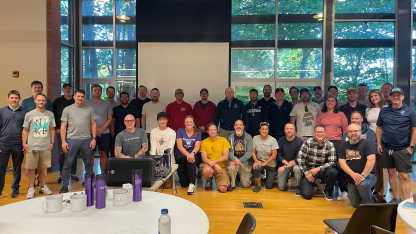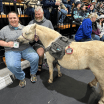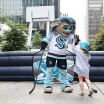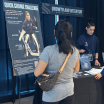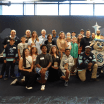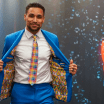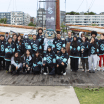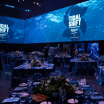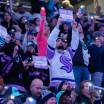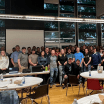Every coach in the NHL no doubt has the ambition to win the Stanley Cup, whether this fast-approaching season or building out a winning culture to contend for the coveted trophy sooner versus later.
For volunteer coaches in the Kraken Youth Hockey Association (KYHA), ambition is encouraged when working with kids via a more holistic definition.
In a preseason training for some 40 volunteer coaches, the Kraken invited Hannah Olson, assistant professor and director of the University of Washington Center for Leadership in Athletics, to facilitate a session and explain the UW center’s approach to “Ambitious Coaching.”
“One of the hardest things for coaches is we have built a youth sports model that is not always developmentally appropriate,” said Hannah, who has two decades of coaching and sports management experience at the high school, college and pro levels. “Sports can be a performative thing in a very public way. Unfortunately, the higher stakes [of winning or losing] come at earlier ages. When I was coming up, that was high school. Now, it affects nine- and 10-year-olds at tournaments.
“It can still be about performance but, in a longer-term perspective, about paying attention to young athletes wholistically. There is a promise in sport as an incredible vehicle for transformation.”
The UW center’s Ambitious Coaching concept aims for such heights for youth sports participants, including the kids playing in the KYHA. Olson told the 40-coach group that an athlete’s “peak performance isn’t achievable without focusing on her/his/their social, physical and psychological health.” She said when a youth hockey coach embraces “the wholistic well-being and growth of an athlete, appreciating their uniqueness, complex life and specific needs,” it goes a long way toward maximizing results on the ice. Perhaps best of all, the young hockey player’s enjoyment of the sport and teamwork comes naturally with this approach.
“We want to flip the [youth sports] environment to more of a mastery climate,” said Olson. “We are urging coaches to promote effort and improvement. Mastery is all about self-reference, not about comparing yourself to a teammate who might be bigger and stronger ... we urge coaches to create space for their players to make mistakes as they work to be better. Sometimes, the best rep is followed by a failed one.”

